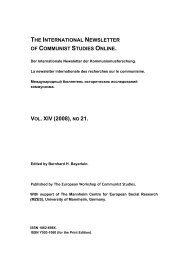11RXNdQ
11RXNdQ
11RXNdQ
Create successful ePaper yourself
Turn your PDF publications into a flip-book with our unique Google optimized e-Paper software.
The Frogs Who Demand a King *<br />
The ‘yes’ vote will be large, very large. But to what will they be saying ‘yes’? The<br />
Constitution? People could not care less about it. A political programme? Rare are the<br />
inscrutable oracles that descend from the lofty firmament about the General’s head. No,<br />
this election is about the man himself. In this compartmentalized country bristling with<br />
barriers, divisions and obstacles, where everyone squabbles with their neighbour over a<br />
bone, the man of unanimity suddenly appears. We all know that if he were to win on 28<br />
September, even with only a narrow margin, he would not consider himself to be leader<br />
of the government, but claim to unite all French people in his person. He is very careful<br />
not to offer anything: and interests down here on earth remain fragmented and<br />
conflicting. But when the electors raise their eyes, they descry beyond the clouds the<br />
fascinating mirage of unity. If we vote for him, Left and Right will be united just like his<br />
left ear and his right; major capital and roadmenders like the top of his head and the soles<br />
of his feet. Many French people hate their neighbours; they will love them in de Gaulle;<br />
everyone will commune in this great entity whose organic indissolubility wishes to<br />
symbolize the highest degree of social integration.<br />
How can people not see, after so many dictatorships, that this mystic communion<br />
would paper over the cracks of our discords<br />
* L’Express, No. 380, 25 September 1958.<br />
without resolving them? How is it that people do not know that a nation projects its<br />
painful desire for unity onto a single man when the contradictions of the moment have<br />
made this very unity impossible? It is as if the elector were dozing. Look around you: the<br />
‘yesses’ and the ‘noes’ are on display everywhere: on walls, in provincial newspapers, in<br />
L’Express. The ‘no’ vote states its reasons, explains its choice, it is impassioned<br />
geometry. The ‘yes’ votes are sighs: they abandon themselves to grand dreams, to grand<br />
sentiments, to grand words, to that flood of tears which has often preceded the setting up<br />
of dictatorships. A dismal enthusiasm: against Reason,‘yes’ invokes the reasons of the<br />
heart that the Reason knoweth not – but their heart is not in it.<br />
This should not surprise us if we were only dealing with de Gaulle’s first supporters,<br />
loyal to their companion of heroic times, the leader they have never ceased to respect.<br />
And in another way, it is natural that a number of people, badly treated by life, should<br />
need to believe in God and, particularly in His Incarnation. How many solitary and<br />
betrayed women have extended their resentment to the whole of the human race: they are<br />
horrified by all things human, they love dogs and supermen.<br />
But young people and young men will cast their vote for the future monarch: active, in<br />
some cases happy, intelligent people who regard themselves in good faith as republicans.<br />
Many are technicians, work in a team, know why a problem occurs and how to resolve it;<br />
in the face of infallibility, they have discovered through practice the importance of




